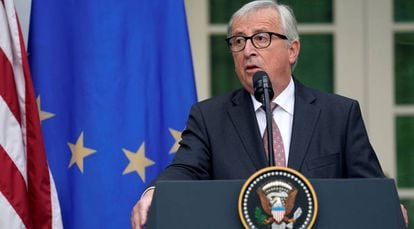EU chief calls Spanish PM and pledges aid to manage immigration challenge
After saying in a letter that “funds are limited,” Commission chief Jean-Claude Juncker promises to release €55 million from emergency fund

The president of the European Commission, Jean-Claude Juncker, on Wednesday spoke on the phone with Spanish Prime Minister Pedro Sánchez to express the EU’s support for Spain in its struggle to handle growing immigration flows, said Spanish government sources.
Foreign Minister Josep Borrell said that the EC president has promised to release €55 million from the EU Emergency Trust Fund for Africa, to be used in assisting Tunisia and Morocco in their management of migration flows on the Western Mediterranean route, whose main point of entry into Europe is Spain.
There will be an immediate release of funds as early as this week to assist Civil Guard officers patrolling the borders
This announcement comes one day after Juncker sent a letter to Sánchez saying that he “shares the sense of urgency” about the rise in irregular immigration, but warning that EU funds to stem the flow from Morocco are limited.
The letter, which this newspaper has had access to, indicated that the release of new funds would depend on a shared contribution by EU member states. “Resources are limited,” wrote Juncker.
On July 25, Spain had sent Brussels a written request for additional emergency aid to manage a spike in arrivals by sea and through the Spanish cities of Ceuta and Melilla, on the northern coast of Africa. Besides listing its own needs, the Spanish government added a list of requests from Morocco, a traditional ally in stemming migration flows into Europe. Sources at La Moncloa, the seat of Spanish government, admitted that for the last two years Rabat has been expecting greater financial support from the EU.
National pact
Spanish PM Pedro Sánchez wants to work together with the main opposition leader, Pablo Casado of the Popular Party (PP), on immigration and other issues of national relevance. On Thursday, Sánchez will propose discussing five main points together: irregular immigration, Catalonia, gender violence, European politics and the infrastructure for the territorial cohesion of Spain. Casado, for his part, wants to sit down with the Socialist Party (PSOE) leader to talk about immigration, Catalonia, election legislation and the budget deficit.
In his written reply, Juncker said that there will be an immediate release of funds as early as this week to assist the Civil Guard officers patrolling the borders. But this will not reduce the growing numbers of undocumented migrants who are heading for Spain from the Moroccan coast. The EC president admits that the deteriorating border controls in Morocco “demand a much greater financial effort.” But the funds for northern Africa are “unfortunately limited.”
A trust fund for Africa was set up in 2015 to manage migration in the countries of origin and transit. The EU budget has contributed €3.5 billion, and in theory the member states should have chipped in a similar amount. But so far, EU countries and other donors such as Switzerland and Norway have only pledged €439 million.
Irregular immigration to Europe has dropped since a peak of around one million arrivals in 2015, but the western Mediterranean route, which uses Spain as an entry point, has increased after Italy and Greece closed their borders. Spain has now become the main gateway into Europe through the Mediterranean, and authorities in southern Spain are struggling to provide proper shelter and assistance to the thousands of migrants who have arrived in recent months.
In July, the EU fund for Africa approved a €55 million border management program for Morocco and Tunisia, of which €30 million are earmarked for Morocco. “The Commission is doing everything in its power to guarantee the speedy execution of this program,” said Juncker’s letter. This program will help Rabat purchase material and train personnel in border control duties.
The EC chief noted that Morocco has benefited from EU migration assistance for 10 years now, during which time it has received over €100 million. In December of last year, the country received a €6 million payment to purchase equipment. However, these figures are far from the €3 billion promised to Turkey in exchange for stemming the migration flow on the eastern Mediterranean.
English version by Susana Urra.












































